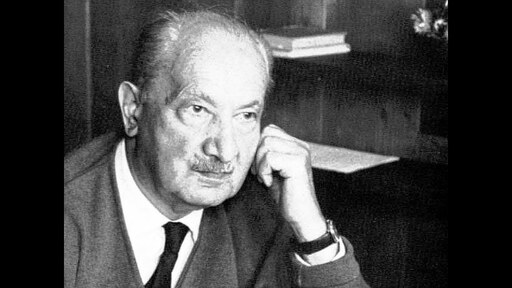On Heidegger – Steven E. Aschheim in TLS:
‘The publication of Martin Heidegger’s so-called Black Notebooks in 2014 was sensational. It made clear that he held an even more radical interpretation of Nazism and subscribed to a deadly antisemitism. Both had been previously known, but their extent and extreme nature were here given undisguised expression, framed less by Heidegger’s earlier existentialist ontology than by his turn (Kehre) to the history – and forgetting, and possible recovery – of Being (Sein). Within this peculiar idiom, for Heidegger the stakes could not have been higher. Given what he described as Jewry’s rootless, calculating, fundamentally anti-spiritual nature, Judentum represented nothing less than “non-Being” and the active principle of “metaphysical destruction”: “The question of the role of world Jewry is not a racial question, but the metaphysical question about the kind of humanity that, without any restraints, can take over the uprooting of all beings from being as its world-historical ‘task’”.
The decision regarding the Jews was therefore rendered ultimate: that “between nothing and Being”. Moreover, employing these same concepts, Heidegger formulated a kind of obscene implicit philosophical account of the Holocaust as an act of Jewish self-annihilation: given that the Jews incarnated the principle of metaphysical destruction, its inherent violence inevitably had to turn against itself and culminate in “ontological massacre”. (In other, more public, places he attributed responsibility for the extermination camps not to National Socialism, but to “western metaphysics” and its endless capacity for instrumental reason and technological domination – Machenschaft).
In this informed, richly documented study Richard Wolin – known for his pursuit of Heidegger in previous works – has set out fundamentally to reassess his subject’s later thought. The Black Notebooks (as well as other publications), he argues, render it impossible to separate that philosophy from Heidegger’s radical politics, his attraction to Nazism and his antisemitism. Older defences that attributed his attitudes to bad character and poor judgement, rather than acknowledging that they formed the integral nature and content of his philosophical thought, are no longer sustainable. Wolin’s indictment – Heidegger in Ruins – is multi-layered, taking in not just Heidegger’s work, but also its defenders and political legacy.’
(…)
‘These connections figure centrally not just in Heidegger’s virulent antisemitism, but also in his related insistence on redemptive German exceptionalism, according to which only Germans are able to articulate “Being in an originary way”, capable of an authentic new beginning, rising above the demeaning vice of “planetary technology”. Separate chapters of Heidegger in Ruins outline in detail the interconnected radical right-wing ideologies of “Work”, “Earth and Soil”, and “Race”. (Though Heidegger rejected rationalistic, instrumental “science” and “biologism”, Wolin insists, his was a consistent racism of the “spiritual” and “mystical” kind that was always central to National Socialist myth, represented by thinkers such as Hans Günther and Ludwig Ferdinand Clauss.)’
(…)
‘Moreover, despite Wolin’s disclaimers that his work is meant to honestly reassess, rather than entirely abandon, Heidegger’s thought, his case is not always helped by a kind of strident prosecutorial tone. While this may put some readers off, this would be a mistake, for despite exhaustively noting his subject’s affinities with other right-wing thinkers, Wolin nevertheless succeeds in demonstrating not only Heidegger’s uniquely conceived ultra-radicalism (the problem with National Socialism, he averred, was is that it had not been radical enough), but also its continuing and pernicious political and intellectual influence.’
(…)
‘In an excellent work, Heidegger and his Jewish Reception (2020), Daniel M. Herskowitz traces this attraction, which combines, on the one hand, admiration and identification with, on the other, critique and rejection. “No other philosopher”, he argues, “had more impact on twentieth-century European Jewish thought than Martin Heidegger.” But important Jewish thinkers, including Leo Strauss, Martin Buber and Emmanuel Levinas, while aware of Heidegger’s highly compromised Third Reich career, were not aware of the Black Notebooks.
Yet, remarkably, a number of twenty-first-century “Jewish” thinkers continue to regard Heidegger’s later Seinsgeschichte thought as foundationally relevant, while acknowledging the devastating dimensions of his Nazism and antisemitism. How are we to account for this contemporary appeal? Like Heidegger, these Jewish thinkers regard western life and mass society, with its nihilistic technological idioms of mastery and control, as a spiritual desert. They too are in quest of an Other, qualitatively different Order, an alternative – as yet unrealized – metaphysics of authentic “Being”.
What all these – postmodernist, right or Jewish – Heideggerians elide is the deeply anti-democratic consequences of Heidegger’s work, the demeaning implications of the loss of liberal and civic institutions, and, as Richard Wolin perceptively notes, “the capacities of democratically minded citizens to contest technology’s implacable ‘sway’”. Heidegger’s longed-for post-1945 world is mystical, solipsistic and ultimately nihilistic: “Only a God can save us”.’
Read the article here.
Full disclosure: In a few articles I’ve taken Heidegger seriously (I also take Schmitt seriously) without having accused him of antisemitism.
Well, there is a tradition there, apparently.
Heidegger as nihilist, because he told a journalist from ‘Der Spiegel’: ‘Only a God can save us.’
He didn’t say, ‘only a Führer can save us.’
Heidegger’s mysticism is needless to say also appalling, but I’m not so convinced that the contemporary illiberals are influenced by Heidegger.
Also, I’d like to know why these Jewish thinkers were exactly attracted to Heidegger – a spiritual desert is a bit meager - as by the way quite a few of Jewish thinkers and leftist thinkers were attracted to Schmitt.
Let me put it this way, if you want to know more about brotherly love all you have to do is watch the movie ‘The Third Man’, again. Or for the first time.
